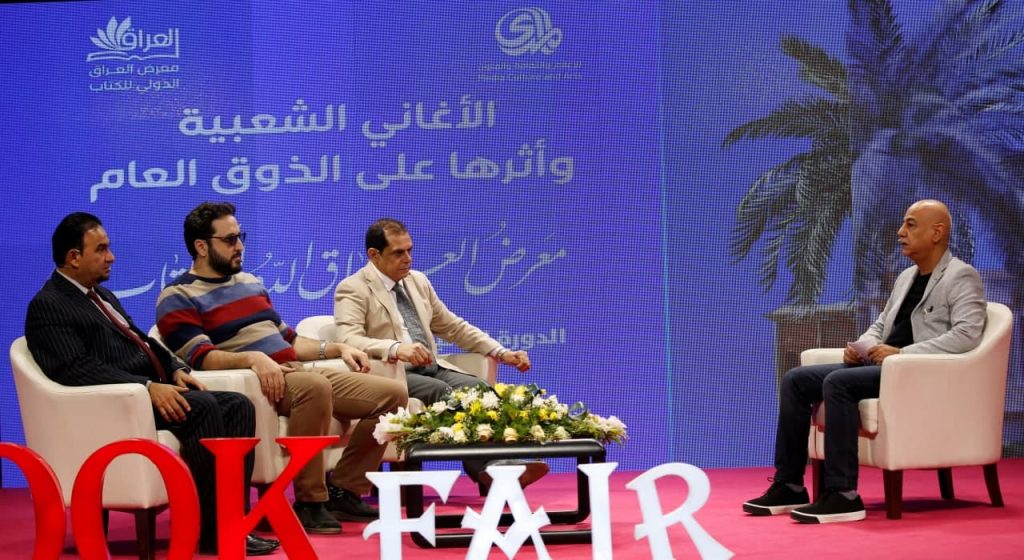
Zain Yousef
Photography: Wissam Al-Aqili
On the sixth day of the activities of the Iraq International Book Fair and in continuation of the seminars, the seminar hall hosted the journalist Adam Makkawi from Egypt, the official of the cinema department at the Faculty of Fine Arts, “Hikmat Al-Baidani”, and Dr. Talal Ali to talk about folk songs and their impact on public taste, which was moderated by critic Samer Al-Meshaal.
Talking about the popular song and its impact on public taste and how to employ it, Adam Makkawi said, “There is no doubt that anyone who follows social media will notice how he jumped to the forefront of the news. The conflict between the head of the Syndicate of Musical Professions in Egypt, Mr. Hani Shaker, and the songs of the festivals, and the songs of the festivals are the most popular template in Egypt currently, and they were called festivals because they originated in popular neighborhoods in the form of a festival and without music, but through programs in the computer, young people are able to They decompose any censorship and talk about conflicts and conflicts between popular neighborhoods, and certainly the words of these festivals were bold, sharp and sometimes decadent.”
He pointed out that “the festivals, after they were confined to certain popular areas, became present in television, events and concerts, so these festivals became directed to everyone, not only the popular class, and this matter opened the door to conflict between the old and the renewed, and therefore the Syndicate of Musical Professions, headed by the artist Hani Shaker, believes that these songs have words that do not suit public taste and issued a list of preventing singing in halls and concerts, and this stature included 30 singers and a festival band because it is accused of offending public taste.”
He added, “Some defenders of the festivals began to go back to narrate the history of Egyptian folk singing, revealing that there are rural songs and books such as the book of Professor Mohamed Shehata “singing ladies of the Egyptian countryside”, this singing contains a lot of words deceptive to modesty, then they went back more to Sayed Darwish, the founder of modern music in Egypt and discovered that his famous trilogy is the trilogy of air conditioners hashish, cocaine and manzool, then they returned to the songs of the worlds such as Munira Mahdia, so the exploration and return In retrospect, it turns out that folk singing contains everything, and for folk art, it is an innate expression of a certain geography, so we find in Egyptian folk art some innate expressions that are outside the classical framework.”
To talk about the impact of the Iraqi folk song on public taste, Dr. Talal Ali said, “We in Iraq have the same problem that Professor Adam talked about, but the difference in Iraq is that the measure has not been taken definitively so far, there is popular rejection and also rejection by specialists, as for the Radio and Television Committee, there is a committee in each country, and as long as you have material that you want to bring out to people in the right way, you must pass through the committees.
He pointed out that “the majority of popular singers failed the tests of these committees because they do not have the technical standards that the committee is looking for, which the educated public is looking for, and many of these popular artists have started looking for the popular song because of its great fame.”
For his part, Dr. Hikmat Al-Baidani said, “We have to distinguish between the heritage song and the popular song, the heritage song extends to its roots and has its history and remained in the memory of people for its originality and the depth of the words and melodies that blended in the essence of the song, while the popular song is present in every time and place, but it is affected by the ocean and the time period in which the song was born, as for the issue of controlling this type of songs, the issue of the absence of the authority of the censor, which is one of the influential things that gave way for the spread of a song that contains obscene words.”
He pointed out that “the spread of these songs due to the lack of authority for the censor, previously the radio and television had filters through which the works pass, and there are important names such as the artist Talib Al-Qaraghuli, Muhammad Noshi and Yassin Al-Rawi, and it was impossible for any artist to pass through this committee, when this episode disappeared, things began to be flat, so downward work appeared, and technology provided a lot and the production of songs and social media began to help in that, and all these things cannot be controlled without the authority of a censor.”
On his vision of the popular song space in Iraq, he said, “This matter is related to the general mood, and if a mood is created for it restricted by the origins and general culture that educates society to fight such songs at the time, I think we will be successful in finding a singing generation that presents committed works belonging to the authentic Iraqi culture.”
